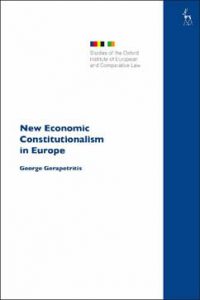The editors of the KSLR EU Law Blog are pleased to announce recent publications in the field of EU law with a special discount for our readers.
The Transformation of Economic Law
Essays in Honour of Hans-W. Micklitz
Edited by Lucila de Almeida, Marta Cantero Gamito, Mateja Durovic and Kai Peter Purnhagen
This book is written in honour of Hans-W. Micklitz for his jubilee 70th birthday and the closure of his twelve-year term as the Chair for Economic Law at the European University Institute (EUI). Hans-W. Micklitz has gained international recognition for dedicating his extensive and fruitful career to diverse areas of law: European Economic Law, European Private Law, National and European Consumer Law, Legal Theory, theories of Private Law and Social Justice. This book is a product of the collaborative endeavors of its contributors, who all have a special connection with Hans W. Micklitz as his doctoral supervisees or research assistants. The collection of twenty chapters is to be read as the influence of Hans’s dialogues in the early stage of the academic career of thirty-one young legal scholars. The volume is divided into three sections devoted to subjects that have received Hans’s attention while at the EUI: EU Consumer Law (part I); European Private Law and Access Justice (part II); the CJEU between the individual citizen and the Member States (part III).
Lucila de Almeida is Postdoctoral Researcher at the University of Helsinki, and Research Fellow at the Florence School of Regulation, Robert Schuman Centre for Advanced Studies, European University Institute.
Marta Cantero Gamito is Assistant Professor of Law at CUNEF (Colegio Universitario de Estudios Financieros, Madrid) and part-time Associate Professor in IT Law at the University of Tartu.
Mateja Durovic is Lecturer in Contract and Commercial Law at Dickson Poon School of Law of King’s College London.
Kai Peter Purnhagen is Associate Professor in Law at Wageningen University.
September 2019 | 9781509932580 | 432pp | Hardback | RSP: £95
Discount Price: £76
Order online at www.hartpublishing.co.uk – use the code CV7 at the checkout to get 20% off your order!
Constitutional Law of the EU’s Common Foreign and Security Policy
Competence and Institutions in External Relations
Graham Butler
The Common Foreign and Security Policy (CFSP) of the European Union is a highly exceptional component of the EU legal order. This constitutionalised foreign policy regime, with legal, diplomatic, and political DNA woven throughout its fabric, is a distinct sub-system of law on the outermost sphere of European supranationalism. When contrasted against other Union policies, it is immediately clear that EU foreign policy has a special decision-making mechanism, making it highly exceptional.
In the now depillarised framework of the EU treaties, issues of institutional division arise from the legacy of the former pillar system. This is due to the reality that of prime concern in EU external relations is the question of ‘who decides?’ By engaging a number of legal themes that cut across foreign affairs exceptionalism, executive prerogatives, parliamentary accountability, judicial review, and the constitutionalisation of European integration, the book lays bare how EU foreign affairs have become highly legalised, leading to ever-greater coherence in how Europe exerts itself on the global stage.
In this first monograph dedicated exclusively to the law of the EU’s Common Foreign and Security Policy in modern times, the author argues that the legal framework for EU foreign affairs must adapt in a changing world so as to ensure the EU treaties can cater for a more assertive Europe in the wider world.
Graham Butler is Associate Professor of Law at Aarhus University, Denmark.
Oct 2019 | 9781509925940 | 376pp | Hardback | RSP: £80
Discount Price: £64
Order online at www.hartpublishing.co.uk – use the code CV7 at the checkout to get 20% off your order!
Critical Reflections on Constitutional Democracy in the European Union
Edited by Sacha Garben, Inge Govaere and Paul Nemitz
This book takes a wide-ranging approach to tackle the complex question of the current state of constitutional democracy in the EU. It brings together a broad set of academics and practitioners with legal and political perspectives to focus on both topical and perennial issues concerning constitutional democracy (including safeguarding the rule of law and respect for fundamental rights) in theory and practice, primarily at EU level but also with due regard to national and global developments. This approach underlines that rather than a single problématique to be analysed and resolved, we are presently facing a kaleidoscopic spectrum of related challenges that influence each other in elusive, multifaceted ways. Critical Reflections on Constitutional Democracy in the European Union offers a rich analysis of the issues as well as concrete policy recommendations, which will appeal to scholars and practitioners, students and interested citizens alike. It provides a meaningful contribution to the array of existing scholarship and debate by proposing original elements of analysis, challenging often-made assumptions, destabilising settled understandings and proposing fundamental reforms. Overall, the collection injects a set of fresh critical perspectives on this fundamental issue that is as contemporary as it is eternal.
Sacha Garben is Professor of EU Law at the College of Europe.
Inge Govaere is Professor of European Law, Jean Monnet Chair in EU Legal Studies at Ghent University and Director, Ghent European Law Institute (GELI) as well as Director of the European Legal Studies Department at the College of Europe.
Paul Nemitz is Principal Adviser at the European Commission, Directorate-General for Justice and Consumers. He teaches EU Law as a Visiting Professor at the College of Europe in Bruges.
Oct 2019 | 9781509933259 | 448pp | Hardback | RSP: £85
Discount Price: £68
Order online at www.hartpublishing.co.uk – use the code CV7 at the checkout to get 20% off your order!
A Practitioner’s Guide to European Patent Law
For National Practice and the Unified Patent Court
Paul England
Written by a team of lawyers with long-standing experience in patent litigation in Europe, this book is a comprehensive and practical guide to European patent law, highlighting the areas of consistency and difference between the most influential European patent law jurisdictions: the European Patent Office (EPO), England & Wales, France, Germany and the Netherlands.
It is frequently the case that the decisions and approaches of these courts are cited by European patent lawyers of all jurisdictions when submitting arguments in their own national courts. The book is therefore intended to provide a guide to patent lawyers acting in the national European courts today. The book also looks to the future, by addressing all the areas of patent law for which the proposed Unified Patent Court (UPC) will need to establish a common approach.
Uniquely, the book addresses European patent law by subject matter area, assessing the key national and EPO approaches together rather than in nation-by-nation chapters; and provides an outline in each chapter of the common ground between the national approaches, as a guide for the possible application of European patent law in the UPC.
Paul England is a solicitor at Taylor Wessing, London.
Oct 2019 | 9781509928606 | 552pp | Hardback | RSP: £110
Discount Price: £88
Order online at www.hartpublishing.co.uk – use the code CV7 at the checkout to get 20% off your order!
New Economic Constitutionalism in Europe
George Gerapetritis
New Economic Constitutionalism in Europe focuses on the institutional mutation of constitutionalism following the major economic crisis in the Eurozone and globally. The main axis is that a new economic constitutionalism has arisen which trespasses on the conventional conceptual foundations and needs to be addressed with novel institutional vehicles. The author proposes an original and searching analysis of the significant constitutional evolutions that have taken place in member states in response to the global financial crisis. The book combines a sophisticated theoretical model of a new form of economic constitutionalism with detailed practical argumentation. This important new work provides a valuable addition to the understanding of this hugely important topic.
George Gerapetritis is Professor of Constitutional Law at the National and Kapodistrian University of Athens.
Oct 2019 | 9781509909629 | 384pp | Hardback | RSP: £85
Discount Price: £68
Order online at www.hartpublishing.co.uk – use the code CV7 at the checkout to get 20% off your order!





